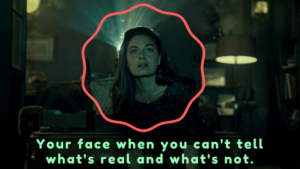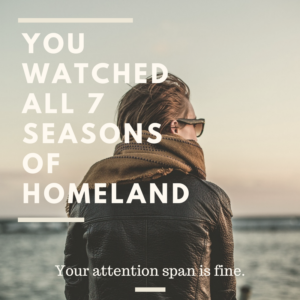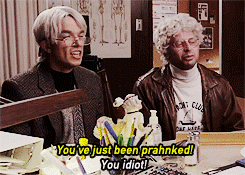There is a strange thing that happens anytime we see something published.
Intellectually we know, just because it’s published, doesn’t mean it’s true. It just means it’s published.
Yet, when we see something published, we start to behave like someone who’s never seen a newsreel before.

Jules in the Man in the High Castle.
We’re in a trance.
There’s something about being “published” that makes our common sense go, “Bye, Felicia” and our lizard brain takes over.
That lizard brain loves it some fake news. Sensationalism, Fear Mongering, Bombast…loves it.
This has been the case since for centuries, which is why it’s a little troubling that we’re only now becoming concerned with “fake news.”
Fake news has been a thing since we invented the printing press. And we keep falling for it. Century after century after century.
The good news about recurring patterns is that you can break them. So, I’m going to explain why you keep falling for fake news so you can punch your lizard brain in the face.
There are three reasons.
Here we go:
Reason 1: Real News is Boring
If you liked real news, you’d be watching CSPAN right now. But you’re not. Because CSPAN is boring.
You’re already bored with your job and your spouse and the drudgery of the 9-to-5, why would you want to be bored while you read the news?
You don’t.
You want to be entertained.

Is that not why you are here!?
If we don’t entertain you, you won’t click, read, or watch what we produce. And if you don’t click, read, or watch – then you don’t get news (and we don’t get paid – but that’s a topic for a different article).
If we can’t get your attention, you won’t even get fake news, you get no news.
So we have to trick you.
Have you ever seen a dog take a pill?
No, you haven’t because they won’t do it. Dogs are weird. If you want your dog to take its medicine you have to hide it in peanut butter.
Same thing with the news. Specifically with what we call “headlines.” (lovingly referred to as “click bait.”)
If I want to get your attention, I need to bait you with headlines that make your lizard brain go “WHAAAAT?! Tell me more…[Click.]”
Otherwise, you’ll ignore me because you’re busy and you don’t want to be bored.
If I called this article “Intro to media literacy” you’d be like, “meh, Mark as read,” and move on with your day. Which is why I had to bait you with something interesting.
It’s also why I’m writing like I’m talking to you instead of like an academic.
It’s so you pay attention.
(Ok fine, it’s also because I’m terrible at writing like an academic.)
Right now, bombastic sensationalist headlines are the only things you’re paying attention to, so they’re going to give you more of those until it stops working.
Reason 2: You’re Being Framed
Let’s say, your mom went to a fundraiser to hear a speaker named Cathy.
When she calls you and recounts the fundraiser, all she tells you about is who was there and what they wore.
You conclude, “What a superficial evening.”
Had you gotten the account from your mom’s friend, Stacey, you’d have heard all about Cathy’s tear-jerking speech on human trafficking.
Both accounts are true.
No one is “lying” to you.
But by highlighting certain things and downplaying others, each person is framing the story differently – causing you to draw completely different conclusions about the evening.
That’s exactly what’s happening with the news.
The fancy academic term for this is “the framing effect.”
IRL it’s understood that someone is leaving things out or giving you what we colloquially refer to as “their side of the story.”
We expect that of our friends, not our media.
And just like with your friends, f you want the full story, you need to go out and find it.
That’s why I recommend treating your media consumption the way you treat your mom and de facto assume it’s being framed and do not draw any conclusions before you consult the rest of the parties involved.
Reason 3: The Landscape Changed, You Didn’t
There’s lots of fun pseudo-science and neurobabble about dopamine hits and shrinking attention spans and how we’re all getting dumber.
None of it is true.
You’re as dumb as you’ve always been. (#sorrynotsorry?)

You watched all 7 seasons of Homeland. Your attention span is fine.
You are the same. That’s the problem.
The landscape has changed and you’re the same.
Back in the day, there were only four channels you needed to keep up with. You kept up with them and generally got the gist.
Deep down, you suspected there was more to the story (see #2), but there was literally no way (literally) to get said “more to the story.”
So, you moved on with your day.
Today, you can get the “more to the story.” But there is no feasible way to do it and still have a life (or a paycheck).
There’s too much information.

Props to the 4 people who get this joke.
It’s not physically possible to consume it all.
But, that doesn’t stop you from trying.
It doesn’t help that we lure you in with our bombastic click-bait headlines (see #1), so you can’t turn off your TV or your computer or your phone and walk away.
You HAVE TO KNOW why Kim got robbed!?! (#punny) JUST ONE MORE CLICK I SWEAR!
And then POOF.
You’re in the click-bait-rabbit-hole-of-doom, set to resurface in an hour or so, still feeling like you haven’t read/watched/learned/commented enough.
It’s Not Your Fault, But It Is Your Problem
It’s a little your fault.
You keep clicking on crap and choosing entertainment over real news. While you might not be able to resist our clickbait, you can combat it. Just like any addict, the road to recovery it begins with awareness of the problem.
So now you know.




